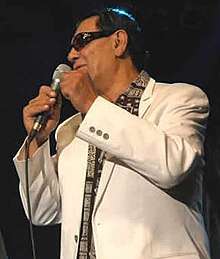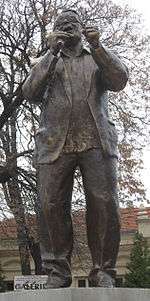Šaban Bajramović
| Šaban Bajramović | |
|---|---|
 | |
| Background information | |
| Born |
16 April 1936 Niš, Kingdom of Yugoslavia |
| Died |
8 June 2008 (aged 72) Niš, Serbia |
| Genres | Serbian–Romani music, Jazz, Blues |
| Occupation(s) | Singer-songwriter |
| Instruments | vocals |
| Years active | 1964–2008 |
| Labels | RTV Ljubljana, Jugoton, PGP RTB, Snail Records |
| Website | www.sabanbajramovic.com |
Šaban Bajramović (Serbian Cyrillic: Шабан Бајрамовић, Serbian pronunciation: [ʃǎban bajrǎːmɔʋitɕ], Romani: Shaban Bajramovičh; 16 April 1936 – 8 June 2008), nicknamed Šabi (Шаби), was a Serbian vocalist and recording artist of Romani ethnicity. He was one of the most internationaly critically acclaimed Romani musicians. Due to his eminent impact on music in Eastern Europe, he was dubbed the "King of Romani music".[1]
In his career, which spanned over four decades, he recorded 50 singles and 20 albums, and he is believed to have composed 700 compositions.
Biography
Origin and early life
Bajramović was born in Niš into a Romani family, in the Gypsy quarters (Ciganska mahala).[2] He spoke of himself "I am not Romani, I am a Serb, a Serbian Gypsy".[3] He attended primary school in Niš for only the first four years. On quitting school, he picked up his musical education on the street. He was nicknamed Šabi (Шаби).[4]
Imprisonment
At 19 years he ran away from the army, out of love. As a deserter, he was sentenced to three years prison on the island Goli Otok. He spent his time as a good goalkeeper in the prison football team. Because of his nimbleness and speed, they called him "Black Panther". Soon he forced his way into the prison orchestra that played, among other things, jazz (mostly Louis Armstrong, Frank Sinatra, and sometimes John Coltrane) with Spanish and Mexican pieces.
Music career
After Goli Otok, his intensive music career began. He made his first record in 1964, with the recording act Crna mamba (Black Mamba). He continued to produce music with Crna mamba for 20 years. The highlight of their career was their performance for Indira Gandhi in India, where he gained the title King of Romani music.[5] He also performed to Yugoslav politician Josip Broz Tito.[6]
In the early nineties, he recorded Đelem, Đelem, which is considered the Romani anthem. At the time, he decided to change his stage presence, starting to wear sunglasses while performing.[7]
Since 2000, he started collaborating with Bosnian-based Sevdah act Mostar Sevdah Reunion, which rose him to prominence yet again. In 2001, he recorded the album A Gipsy Legend with the group, released on behalf of New World Connection, which gained international attention.[8]
In 2002, he worked with Croatian band Cubismo and Ljiljana Buttler. Their partnership resulted in the appearance of Geljan dade, one of Bajramović's best known songs.[9]
In 2005, Miloš Stojanović and Dragi Šestić directed his biopic film, titled Šaban, which gained notoriety in Eastern Europe.[10]
In 2008, he produced Lova with Serbian hip-hop artist Sky Wikluh for the Serbian TV Series Vratice se rode.
Last years

In 2008, it was revealed that Bajramović was living impoverished in Niš with serious health complications and was no longer able to walk. The government of Serbia intervened to provide him with some funds.[11] He died in Niš on 8 June 2008, from a heart attack.[12]
Personal life
Bajramović enjoyed reading, and claimed he read over 20 000 books.[13] He was married to Milica Bajramović and had four children.
Legacy
Influence
Bajramović was a prominent figure in Serbian music presenting Romani music in modern Serbian. Due to his enormous influence, on 12 August 2010, a statue to honour his impact was built. The statue had been vandalised multiple times.[14]
Time Magazine polled Bajramović in the top 10 best jazz musicians.[15]
Quotes
| “ | Over the years, his music has been constantly stolen, copied, and imitated by both famous and unknown musicians. Promises and contracts have proven worthless. Actually, he's never been interested in protecting his work. Where others would have earned millions, he's lived as he's always lived: from day to day, making music, going wherever he wants, and not recognising any limits at all. | ” |
Dragi Šestić - Mostar Sevdah Reunion
| “ | Šaban Bajramović is clearly a giant talent, comparable in his own way to Nusrat Fateh Ali Khan or Mari Boine Persen, someone capable of bringing their music to life with such vivid spirituality that it vaults with ease over the most impenetrable cultural barriers. His voice combines the anguish of rai with the soulfulness of fado - a sort of Balkan gypsy jazz | ” |
Andy Gill - The Independent, UK, 15 February 2002
References
- ↑ "Saban Bajramovic, kralj romske muzike koji se nikad nije odrekao Nisa". www.juznevesti.com.
- ↑ "Doznajemo". Doznajemo.
- ↑ Ђорђевић 2011, p. 121
"Какав Ром, ја сам Србин, српски Циганин"
- ↑ Ђорђевић 2011, p. 117
- ↑ "Ederlezi Avela, 1969. UZ OSAMDESETU GODIŠNJICU ROĐENJA > Ko je bio Šaban Bajramović?". www.vreme.com.
- ↑ "DESET GODINA OD SMRTI ŠABANA BAJRAMOVIĆA". www.romi.hr.
- ↑ "Siromah koji je iza sebe ostavio bogatstvo". www.lupiga.com.
- ↑ "Šaban Bajramović Discography". www.discogs.com.
- ↑ "Šaban Bajramović Discography". www.discogs.com.
- ↑ "Miloš Stojanović (redatelj filma "Šaban"): "Šaban Bajramović je vrhunska umjetnost"". www.muzika.hr.
- ↑ "Šaban Bajramović siromašan i teško bolestan". slobodnadalmacija.hr.
- ↑ "Преминуо певач Шабан Бајрамовић (The singer Šaban Bajramović has died)". Радио-телевизија Војводине (Radio-Television of Vojvodina). 8 June 2008. Retrieved 8 June 2008.
- ↑ http://www.blic.co.yu/reportaza.php?id=44778
- ↑ "Antifasisti ocistili Spomenik Sabanu Bajramovicu". www.blic.rs.
- ↑ "DESET GODINA OD SMRTI ŠABANA BAJRAMOVIĆA". www.romi.hr.
Sources
- Драгољуб Б Ђорђевић (2011). Казуј крчмо Џеримо: периферијска кафана и около ње (in Serbian). Službeni Glasnik. pp. 117–121. ISBN 978-86-6055-010-3.
External links
| Wikimedia Commons has media related to Šaban Bajramović. |